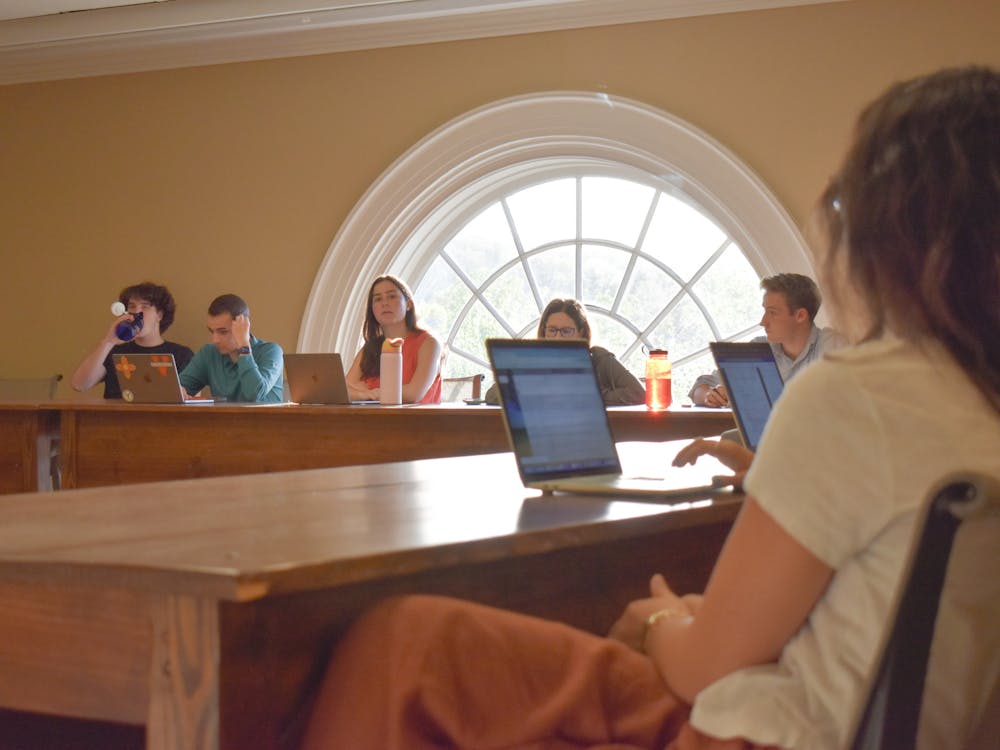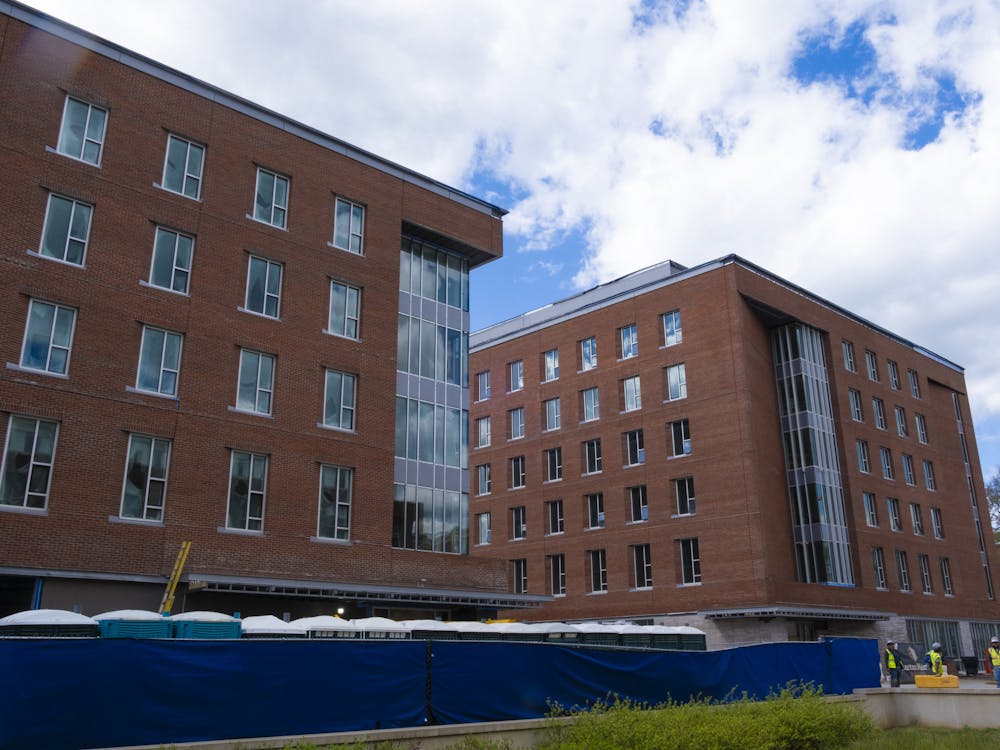While most of the University struggles to deal with the state's withdrawal of funds this year, two of the University's schools have decided to go cold turkey.
In a matter of months, both the Law School and Darden School will cease taking state funding, perhaps for good.
"I think it's permanent," Law School Dean John Jeffries Jr. said. "State dollars are scarce; I think they are likely to be scare for the foreseeable future."
Darden spokesman Phillip Giaramita said self-sufficiency will begin at Darden in the fall of 2003, while Jeffries said the process is "nearly complete" at the Law School as well.
Neither the Law nor the Darden School received any state funding this year, though officials said this was a result of budget cuts rather than the implementation of the self-sufficiency plan.
University officials think the move to self-sufficiency will not only benefit the two schools themselves, but also the University as a whole.
Since the Law and Darden Schools will not take state money, more public funds will be available to the rest of the University, said Colette Sheehy, vice president for management and budget.
"The University gains some redirection of the state support that has traditionally gone to Law and Darden," Sheehy said.
Officials at the schools say they will gain increased autonomy from the self-sufficiency plan.
Both schools now will be able to propose the tuition rates they want to the Board of Visitors, Sheehy said.
"It makes us a little bit more masters of our own destiny," Jeffries said.
Officials said they hope some of the added autonomy will help Law and Darden remain competitive with top law and business schools.
"They have more freedom in recommending tuition strategies and in hiring and paying their faculty," said Leonard W. Sandridge, University executive vice president and chief operating officer. "They can recommend their faculty receive raises different than those appropriated by the state generally if they need to do so to remain competitive with their peers."
Self-sufficiency also could help Law and Darden Schools by increasing private donations to the two schools, officials said.
Part of the self-sufficiency agreement with the University allows private contributions to Law and Darden to be used exclusively by those two schools, and Jeffries said this could stimulate greater giving.
"It's a very good idea that private fundraising be responsive to donor wishes," Jeffries said.
Self-sufficiency also will help Darden form stronger ties to the business community, Giaramita said.
The idea of self-sufficiency has been discussed since the early 1990s and is not directly attributable to the state's budget crisis, Sandridge said.
Instead, officials said the idea stemmed from the belief that Law and Darden Schools could support themselves and that self-sufficiency would help the school remain competitive by giving them more flexibility.
"The idea came about because of Darden and Law's national ranking and the desire to maintain the quality that had been built over the years," Sandridge said.
"We're a prominent school," Jeffries added. "There's a lot of demand among prospective students."
This demand, along with the strong fundraising abilities of both schools, led officials to believe self-sufficiency was an achievable goal.
The perception that tuition at Darden and Law was much lower than at peer institutions also spurred both schools toward self-sufficiency, officials said.
"There was a feeling at the time that Darden and Law were terrifically under-priced," Board Secretary Alexander "Sandy" Gilliam Jr. said.
Sheehy agreed.
"They felt that they had room to move their tuitions up higher in proportion to their peers," she said.
Higher tuition is one way Law and Darden plan to offset the loss of state funds.
This year, tuition at Darden costs $28,000 for in-state students and $33,000 for out-of-state students, while tuition at the Law School is $20,627 for in-state students and $26,967 for out-of-state students.
"It's likely that it will increase next year," Giaramita said.
In recent years tuition at the Law School has increased faster than at most of the University's schools, in preparation for self-sufficiency, Jeffries said.
Giaramita said another way Darden will offset the loss of state funds is through expanding the school's enrollment and thus increasing tuition income.
Darden has added 60 more students this year and will add 60 more next year, he said.
Darden enrolled 300 students this year.
Darden also seeks to expand its private fundraising.
"It does compel us to broaden our fundraising effort, particularly with the business community," Giaramita said.
In contrast, Jeffries said though the Law School will look for additional private funding he said this is not critical to the school's self-sufficiency.
"Financial self-sufficiency isn't about private funding," Jeffries said. "Tuition generates most of the dollars an institution needs."
The rising tuition costs that have accompanied the move toward self-sufficiency have led some students and officials to worry that the Law and Darden Schools will have a harder time paying for student financial aid.
Rees Morgan, president of the Law School's Student Bar Association, said though he thinks self-sufficiency is a "great idea" he also is concerned about the effect on financial aid.
"The problem is that every time the tuition goes up there is not a corresponding increase in scholarships and financial aid," Morgan said.
Jeffries expressed similar concerns and said finding money for financial aid is the Law School's "top priority."
Morgan said he thinks the Law School ultimately will have the money it needs for financial aid because the school, after working on new building projects for the last few years, can now put more funding toward student support.
"I think the building is done," Morgan said.
Financial aid funding is a concern at Darden as well, particularly because of the school's expanding enrollment, Giaramita said.
"When you're out there trying to recruit the best students it often makes a difference if you can offer scholarships or partial scholarships," he said.
Despite this concern, officials both at the University and in state government are supportive of the self-sufficiency efforts.
"I view it as potentially necessary," Virginia Secretary of Education Belle Wheelan said.
Lacey Putney, speaker of the Virginia House of Delegates and chairman of the House's higher education subcommittee, agreed, saying he thought the idea of self-sufficiency at the Law and Darden Schools was "wonderful."
These individuals and University officials, both of whom are opposed to any privatization or partial privatization of the University, see self-sufficiency as something completely different.
Self-sufficiency will not have a significant impact on the way the Law and Darden Schools are run, officials said, with ultimate authority coming from the Board, whose members the governor appoints.
Officials said self-sufficiency will not cause any loosening of regulations at the Law and Darden Schools.
"It doesn't change our obligations to the state or to the University from a governance standpoint," Giaramita said.
Both schools will charge $5,000 less for in-state students than out-of-state students once self-sufficiency is in place.
Also, University officials stress that self-sufficiency will not weaken the relationship between the schools and the University as a whole, in spite of the added autonomy for the two schools.
For example, under self-sufficiency, the Law and Darden Schools will give 10 percent of the money they raise from tuition to the University.
Law and Darden officials also agreed to continue participate in University-wide spending cuts whenever the state recommends such measures.
"In times of financial distress, Law and Darden are not standing aside saying, 'not our problem'" Jeffries said.
Thus, officials maintained that self-sufficiency is not a break between the two schools and the University or even necessarily a break between the schools and the state.
Instead, officials said they hope self-sufficiency represents the best way for the Law and Darden Schools to continue to serve the University as a whole.
"We are still part of the University, proud to be it," Jeffries said.




